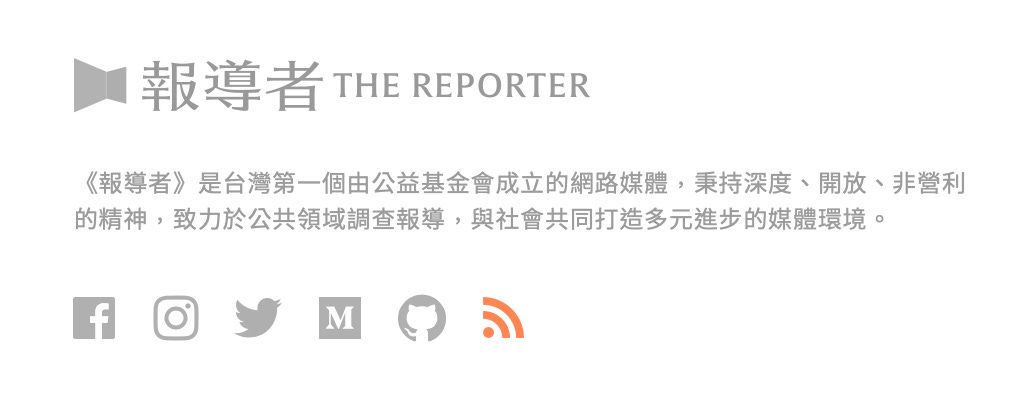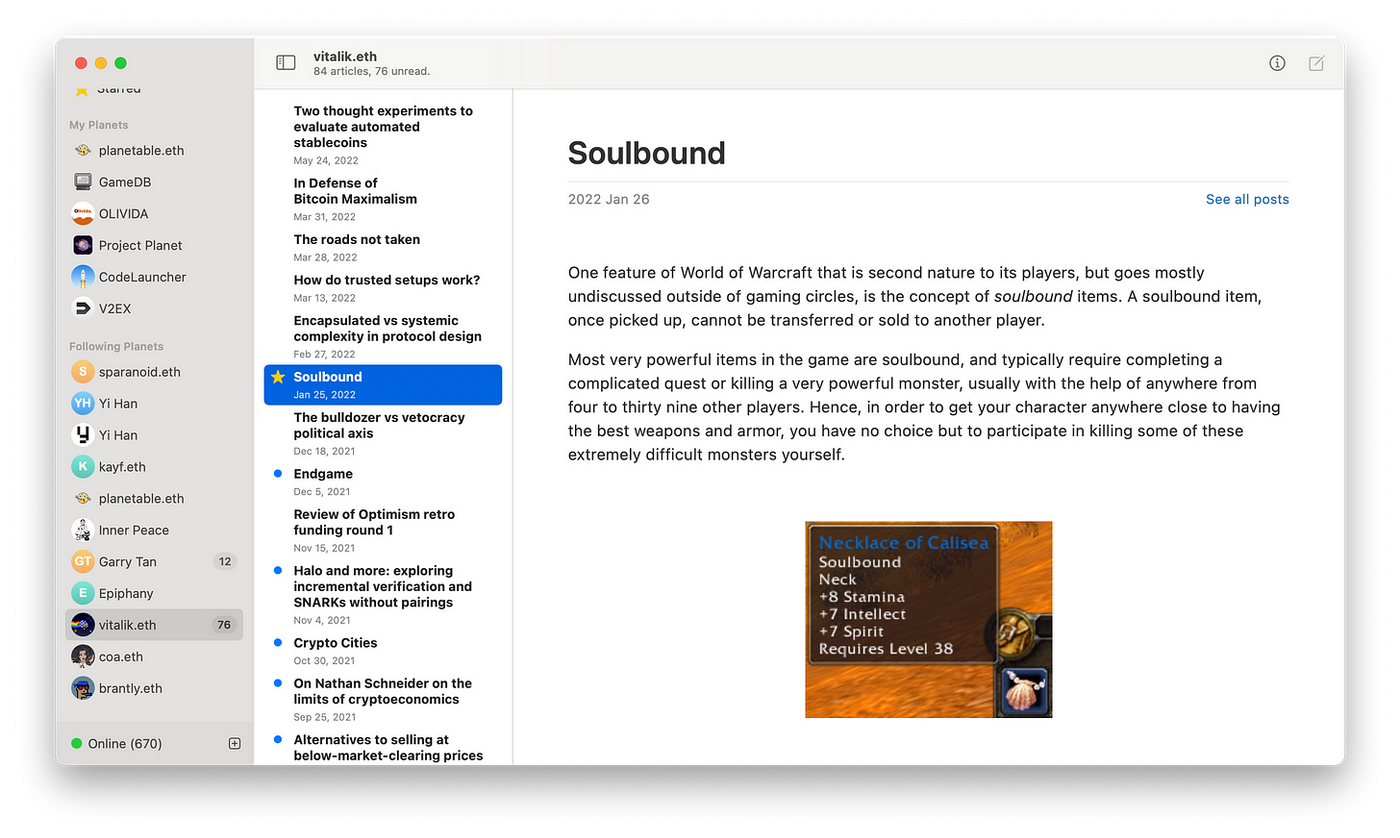Planet: An IPFS reader, an asymmetric defense system for content
2022 has come to an end, and most of the media's attention on the currency circle is still on the aftermath of FTX. While cryptocurrencies are the first application for many people into Web3, they are far from the only one. This article discusses how Planet , a tool with a very young interface, can become people's IPFS reader and build an asymmetric defense system for content.
Below is a screenshot of the Reporter website. You must be familiar with the small icons from left to right, namely Facebook, IG, Twitter, Medium and GitHub, but the orange logo on the far right is relatively uncommon - it is an RSS feed.

The function of RSS is very simple, and its purpose is similar to YouTube's "turn on the little bell". As long as you subscribe to the website's RSS feed, you will be notified of future updates as soon as possible. It's just that YouTube's "turning on the little bell" is limited to audio and video content on the platform. RSS is more versatile, not only can track cross-site, cross-platform content, some people even use RSS to build a personal exclusive knowledge base, and organize YouTube videos, Facebook posts and website articles together.
In the future, as long as you open an RSS reader, such as Feedly, you will be able to catch all the content you often watch. Not only saves the trouble of opening different apps, but also won't be led by the nose by the algorithm of the platform. The protagonist of this article, Planet, is not only an RSS reader, but also a Web3 content tool with both reading and writing functions.
But when you see this, you may want to ask first: "What are the benefits of putting content on Web3?"
luck and misfortune
For most Taiwanese, cryptocurrencies are superfluous, and decentralization is synonymous with hype. This is luck, but also misfortune.
Fortunately, the government has made it easy for people not to worry about centralization. Taiwanese generally regard cryptocurrency as an investment tool, unlike Turkey and Argentina who regard it as a survival skill. Putting content on IPFS by Taiwanese is just an additional backup, unlike Chinese users who worry about content being "disappeared" at any time.
But because of this, Taiwanese need to use a richer imagination to understand the practicality of Web3 and decentralization. According to Planet founder Livid:
Planet is an open source macOS native app that allows users to build websites or blogs on IPFS through their own computers, and this website or blog can also be bound to an ENS domain name (such as the end of .eth). Since both IPFS and ENS are decentralized, the websites published by users, including domain names and content, will not be controlled by any commercial company. Others can track updates through Planet, and content can reach audiences directly without relying on centralized cloud services.
Take the "white paper revolution" that broke out in China in November as an example. Because people's speech was restricted, the "sensitive content" published on Weibo and WeChat would be disappeared immediately, and they could only rely on the foreign social platform Twitter to speak out. , get first-hand information. But even so, operators of Twitter accounts still have to worry about their accounts being wiped out.
Web3 is the people's weapon. Publishing content on a centralized platform is as dangerous as putting cryptocurrency on a centralized exchange. The most appropriate solution is to keep assets and content in a decentralized manner.
After the FTX incident, many people took their cryptocurrencies out of the exchange and kept their assets in their personal wallets. However, there are still very few people who choose to transfer articles out of the centralized platform and store them in the IPFS decentralized network. It's not that people give up resistance, but that the decentralized content ecosystem has just sprouted, and the lack of useful writing and reading tools on the market helps people gradually leave the centralized platform. Planet fills that gap.

The basic functions of Planet are a bit like Matters. Although both can create, read and tip, the market positioning is completely different.
Using the existing network service as a metaphor, Matters is more like Medium, which mainly publishes articles to IPFS and uses the user reward mechanism as an algorithm to determine the order of content exposure. But Planet is like WordPress, which builds personal websites directly on IPFS for users. Each website is independent, and there is no algorithmic ranking and recommendation. What content users want to see depends entirely on their own initiative to subscribe.
Putting content on IPFS is like putting assets on the blockchain, which is kept in a decentralized manner. Creators no longer have to worry about content being removed or being forced to move if the platform shuts down. In addition, decentralization has another benefit - so that content does not have to be tied to a specific platform, and can appear in different places at the same time.
content interoperability
Block potential has repeatedly discussed the benefits of a decentralized content ecosystem. For example, community posts published through Lens Protocol can appear on different social platforms such as Lenster or Iris at the same time. From then on, people can take the "social graph" with them, and they don't have to re-explain their lives every time they register a set of accounts.
Before and after the US House of Representatives Speaker Nancy Pelosi visited Taiwan in July this year, Taiwan’s Ministry of Digital Development also established an asymmetric defense system through IPFS. The website of the Digital Development Department can be viewed through browsers that support IPFS at any time, and it is difficult to be paralyzed by hackers.
Matters was also attacked by a DDoS network similar to a busy phone line at the time, and the website could not be accessed for several days. Afterwards, many users complained: "What's the use of Matters putting articles on IPFS? It's not like you can't see the content."
But in fact, it's not. The articles on IPFS are actually intact, it's just that people lack another way to get them to IPFS. Therefore, as long as the Matters website is "busy" by hackers, users will not be able to enter. The most intuitive solution is to create another channel for users to obtain articles from IPFS - Planet.
According to an announcement from Matters in October:
Matters Lab announced a strategic partnership with Planet, the two parties will further develop social and authoring protocols in the Web3 field...providing more interoperability and better user experience.
In the initial phase, readers will be able to subscribe to content published by authors through Matters through Planet completely decentralized... In the second phase, readers will be able to read, appreciate and comment on any work published on IPFS on Matters. Whether through Planet or other channels, Matters will be a community and amplifier for curating and discovering great content.
We plan to eventually allow users to switch freely between Planet and Matters...to achieve true interoperability, which will be a new dynamic that Web3 has promised but has not yet arrived.
In other words, if the Matters website is attacked by DDoS again in the future, people will be able to obtain past articles published on Matters through Planet. You can even continue to publish new articles through Planet, and when the Matters website returns to normal, the articles will automatically appear on Matters.
If the 3rd, 4th, and 5th tools similar to Planet come out in the future, it will be more and more difficult and costly for hackers to hack these applications at the same time, but for users, it will only change an app That's all. This is the content of the asymmetric defense system.
The "blank paper revolution" applied in China. It is precisely because the current information reception and transmission mainly rely on centralized platforms that the Chinese government can block it through the Great Wall of the Internet, and even randomly check passers-by’s mobile phones to see if they have the Twitter app installed.
But if one day, people's information is mainly released and received in a decentralized way, and the information does not exist in specific applications at all. Not only is blocking difficult, but every reader looks suspicious.
asymmetric defense system
If wallets are people’s entry into the cryptocurrency world, tools like Planet are people’s entry into the decentralized content ecosystem. The more entrances and exits, the better.
The development of the Web3 content ecosystem is like the early currency circle. The tools for people to publish and read content on IPFS are still very limited. As long as Matters is down, people worry that their articles won't be found. But as there are more and more Web3 content tools like Planet on the market, users can gradually understand the specific purpose of putting articles on IPFS.
Planet brings people closer to IPFS, but more tools like this are needed to gradually build an asymmetric defense system for content.
Block Potential is an independent media that maintains its operations through paid subscriptions by readers. The content does not accept distribution by manufacturers. If you think the article of Block Potential is good, welcome to share it. If you have spare capacity, you can also support the block potential operation with regular quotas. If you want to check the content of past publications, you can refer to the article list .
Writing NFT
further reading
Lens Protocol: A social graph that you can take with you
Interplanetary File System: How to use Web3 to deal with the war of attrition in cyber attacks?
Bluesky: Web3 Decentralized Social Network Supported by Twitter
Like my work? Don't forget to support and clap, let me know that you are with me on the road of creation. Keep this enthusiasm together!








- Author
- More